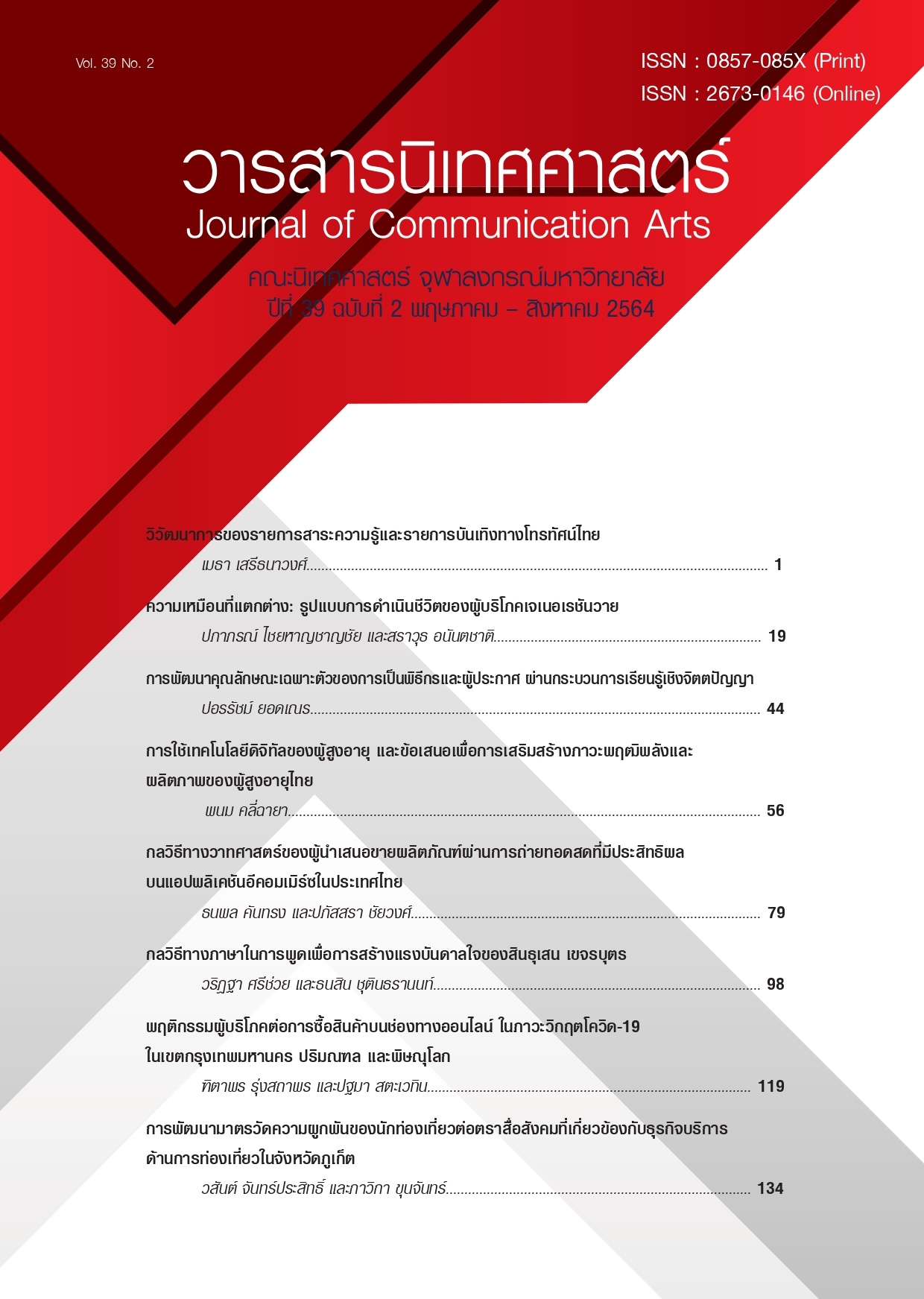Developing of unique characteristics of being Announcer MC through Contemplative approach
Main Article Content
Abstract
The Research on Developing of unique characteristics of being Announcer MC through Contemplative approach is Classroom Action Research in the classroom context that focuses on an experimental learning process , conducted with eight samples who are the third-year and fourth-year student studying at the Faculty of communication arts, Chulalongkorn University, majoring and minoring in Speech Communication and enrolling in the Announcer and Master of Ceremonies course in the second semester of 2017 academic year. The purposes of the study are 1) to find and develop the ability to understand strength and weakness of the samples through the contemplative learning approach, and 2) to develop the unique characteristics of an announcer/ MC through the contemplative learning approach. The results indicated that the used contemplative learning approach that consists of learning through direct-experience practices in every lesson, discussion with a professional announcer/MC guest speakers and the sharing of ideas or idea sharing among classmates and the lecturer to encourage students to understand their strength and weakness by contemplating and reflecting their inner thoughts through weekly reflection-writing notes. Besides, from the pre- and post-test, it is found that students change the most in the knowledge and understanding of nonverbal aspects the most, which are: breathing, the use of voice and vocal quality, and Thai pronunciation, personality aspects: physical appearances, posture, and dressing, and verbal aspects: problem-solving at hand, appropriate word choice for each task, excitement control, and interviewing technique. After learning through practices and the lecturer’s knowledge and experiences, students can apply what they learn to be an announcer/MC in various forms, i.e., news report, event, interview, etc. and knowing how to develop their unique personality and proper dressing. Besides, Contemplative learning process helps students find their unique character by compiling self-evaluation from practices in all dimensions and from their notes, students find for which type of announcer/MC their distinguished characteristics are suitable. Moreover, they can see their weaknesses and can make proper plans for developing themselves and apply them for their future profession.
Article Details
References
กรศศิร์ ชิดดี, และณัฐพร อุทัยธรรม. (2556). กิจกรรมจิตตปัญญาศึกษา : กลยุทธ์การพัฒนา บุคลิกภาพนักศึกษาพยาบาล. Princess of Naradhiwas University Journal, 5(2).
จิตต์สุขุม พวงเพชร. (2548). รูปแบบและลีลาการสัมภาษณ์ของพิธีกรรายการประเภทสนทนาเชิงสาระทางโทรทัศน์. (วิทยานิพนธ์ปริญญามหาบัณฑิต). จุฬาลงกรณ์มหาวิทยาลัย, คณะนิเทศศาสตร์.
จุมพล พูลภัทรชีวิน. (2552, 18 มกราคม). จิตตปัญญาศึกษาและการเรียนรู้สู่การเปลี่ยนแปลง. โพสต์ทูเดย์, 12.
ชมพูนุท สถิตย์เสมากุล. (2554). ปัญหาการคุ้มครองลักษณะท่าทางของพิธีกร ตามพระราชบัญญัติลิขสิทธิ์ พ.ศ.2537. (วิทยานิพนธ์ปริญญามหาบัณฑิต). มหาวิทยาลัยอัสสัมชัญ, คณะนิติศาสตร์.
ช่อผกา วิริยานนท์. (2539). กระบวนการสร้างและรักษาความนิยมของพิธีกรโทรทัศน์. (วิทยานิพนธ์ปริญญามหาบัณฑิต). จุฬาลงกรณ์มหาวิทยาลัย, คณะนิเทศศาสตร์.
ชิดชงค์ ส.นันทนาเนตร. (2549). ทฤษฎีการเรียนรู้สำหรับผู้ใหญ่. นครปฐม: คณะศึกษาศาสตร์ มหาวิทยาลัยศิลปากร.
ณุชชนา วุฒิโอฬาร. (2552). ความสามารถทางการสื่อสารของพิธีกรยอดนิยมในรายการโทรทัศน์. (วิทยานิพนธ์ปริญญามหาบัณฑิต). จุฬาลงกรณ์มหาวิทยาลัย, คณะนิเทศศาสตร์.
ทิศนา แขมมณี. (2545). ศาสตร์การสอน:องค์ความรู้เพื่อการจัดกระบวนการเรียนรู้ที่มีประสิทธิภาพ. กรุงเทพมหานคร: สำนักพิมพ์แห่งจุฬาลงกรณ์มหาวิทยาลัย.
ปอรรัชม์ ยอดเณร. (2544). การศึกษาปฏิสัมพันธ์ระหว่างพิธีกรและวิทยากรรายการสุขภาพทางโทรทัศน์ในเชิงชาติพันธุ์วรรณนาแห่งการสื่อสาร. (วิทยานิพนธ์ปริญญามหาบัณฑิต).จุฬาลงกรณ์มหาวิทยาลัย, คณะนิเทศศาสตร์.
โลว์, เจเน็ต. (2544). Oprah Winfrey Speaks: Insight from the World's Most Influential Voice [วาทะของ โอปราห์วินฟรีย์: พิธีกรรายการทอล์กโชว์อันดับ 1 ของโลกและผู้หญิงที่ร่ำรวยที่สุดของอเมริกา]. ซัคเซสมีเดีย.
สุกัญญา สมไพบูลย์ และ ปอรรัชม์ ยอดเณร. (2550). ออกทีวีให้ดูดี : การปรากฏตัวทางโทรทัศน์ในหลากหลายรายการ. กรุงเทพมหานคร: จรัลสนิทวงศ์การพิมพ์.
สุชีวา สิทธิจินดา. (2554). การรับรู้บทบาทและอัตลักษณ์ของพิธีกรรายการวิทยาศาสตร์ทางโทรทัศน์. (วิทยานิพนธ์ปริญญามหาบัณฑิต). จุฬาลงกรณ์มหาวิทยาลัย, คณะนิเทศศาสตร์.
เหมือนฝัน ประสานพานิช. (2548). กระบวนการคัดเลือกพิธีกรและผู้ประกาศข่าวของสถานีโทรทัศน์กองทัพบกช่อง 7. (วิทยานิพนธ์ปริญญามหาบัณฑิต). จุฬาลงกรณ์มหาวิทยาลัย, คณะนิเทศศาสตร์.
อรวี บุนนาค. (2559). กลวิธีความไม่สุภาพในการสัมภาษณ์บุคคลในกระแสของพิธีกรช่องโทรทัศน์ทางเลือกใหม่. วารสารช่อพะยอม, 27(2), 13-24.
อุรัสยาน์ สุขะตุงคะ. (2546). สถานภาพและบทบาทของพิธีกรถ่ายทอดสดงานพระราชพิธีทางโทรทัศน์. (วิทยานิพนธ์ปริญญามหาบัณฑิต). จุฬาลงกรณ์มหาวิทยาลัย, คณะนิเทศศาสตร์.
อุษณีย์ นิติยานนท์. (2550). พฤติกรรมการเปิดรับ และความพึงพอใจที่มีต่อรูปแบบและพิธีกรรายการ “คนค้นฅน”. รายงานโครงการเฉพาะบุคคลปริญญามหาบัณฑิต สาขาวิชาการจัดการการสื่อสารภาครัฐและเอกชน. มหาวิทยาลัยธรรมศาสตร์.
แอน ทองประสม. (2548). พฤติกรรมการเปิดรับ และความคิดเห็นของผู้ชมต่อรูปแบบและพิธีกร รายการ แอน-นัท ไม่จำกัด. (รายงานโครงการเฉพาะบุคคลปริญญามหาบัณฑิต). มหาวิทยาลัยธรรมศาสตร์, คณะวารสารศาสตร์และสื่อสารมวลชน.
Cranton, P. (2002). Teaching for Transformation. New Directions for Adult and Continuing Education, 93, 63-72.
Martin, J. (2003) The Education of John Dewey A Biography. Retrieved December 1, 2020, from http://cup.
columbia.edu/book/the-education-of-john-dewey/9780231116763
Mezirow, J. (1991). Transformative Dimensions of Adult Learning. San Francisco: Jossey-Bass.
Mezirow, J. (1996). Contemporary paradigms of learning. Adult Education Quarterly, 46(3), 158-172.
Mezirow, J. (1997). Transformative learning: Theory to practice. New Directions for Adult and Continuing Education, 74, 5-12.
Mezirow, J. (2003). Transformative learning as discourse. Journal of Transformative Education, 1(1), 58-63.
Emand, N. I. & Fraser, S. (2000). The Educational Theory of John Dewey (1859 - 1952). Retrieved December 1, 2020, from https://www.newfoundations.com/GALLERY/Dewey.html
Shook, F., Larson, J., & DeTarsio, J. (1998). Television Field Production and Reporting. New York: Longman.
Taylor, E. W. (1997). Building upon the theoretical debate: A critical review of the empirical of Mezirow’s transformative learning theory. Adult Education Quarterly, 48(1), 34-59.


